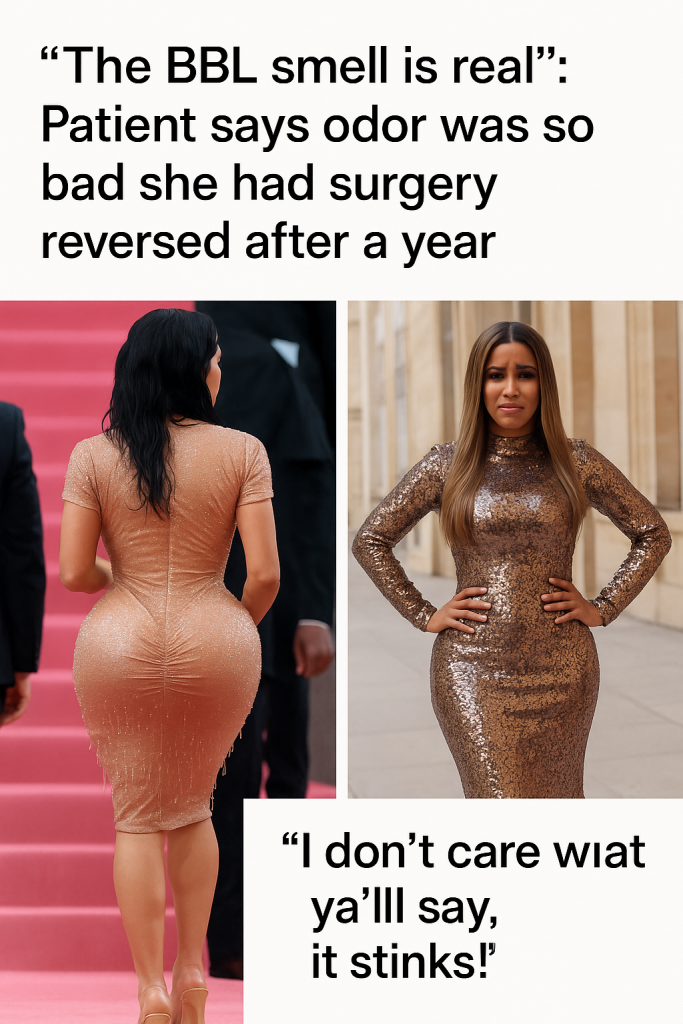The Brazilian Butt Lift (BBL), a popular cosmetic procedure known for enhancing curves by transferring fat to the buttocks, has recently come under scrutiny—not for its aesthetics, but for an unusual and disturbing side effect reported by at least one patient. In a case that has sparked widespread social media discussion and renewed safety concerns, a woman claims the odor emanating from her BBL was so unbearable that she ultimately decided to reverse the surgery, about a year after having the procedure done.
Unpleasant Odor Sparks Surgery Reversal
The patient, who has spoken openly about her experience on social media, described the smell as “putrid” and “impossible to ignore.” She stated, “I don’t know what ya’ll say, it stinks!” The persistent odor reportedly began several months after the surgery and worsened over time, compelling her to undergo a corrective reversal surgery to remove the transferred fat tissue. According to the patient, the smell was so consistent and strong that it severely impacted her daily life and social interactions.
Understanding the Cause Behind the Odor
Medical experts explain that while BBLs are generally safe when performed by board-certified surgeons, complications can arise. The procedure involves harvesting fat from one part of the body and injecting it into the buttocks to create volume and shape. If fat tissue does not receive adequate blood supply after transfer, it may die—a process known as fat necrosis.
“Fat necrosis can lead to the formation of cysts or oily nodules,” noted cosmetic surgeons familiar with such complications. “In some rare cases, these areas may become infected or develop an odor due to bacterial activity and the breakdown of fatty tissue.”
While odor is not a commonly reported complaint in medical literature, patient experiences like the one emerging in 2024 raise awareness of this less-discussed risk.
Experts Urge Caution and Thorough Consultation
Plastic surgeons warn prospective BBL patients to carefully vet their providers and discuss all potential complications, including rare side effects such as odor or fat necrosis. Adequate post-operative follow-up is crucial for early identification and treatment of any issues.
“If a patient experiences unusual symptoms such as persistent odor, swelling, or pain months after surgery, they should seek medical evaluation immediately,” stated a board-certified plastic surgeon. “Prompt intervention can prevent progression and more invasive corrective procedures.”
Social Media Fuels Awareness and Debate
The patient’s revelations have reignited online conversations about BBL safety, with many users sharing similar anecdotes or expressing caution. The hashtag #BBLSmell has trended briefly on social media platforms, exemplifying how patient experiences can influence public perception of cosmetic procedures.
Final Thoughts
While the Brazilian Butt Lift remains a sought-after cosmetic enhancement, this unusual and alarming complication underscores the importance of comprehensive patient education and transparent communication between surgeons and clients. Odor issues related to transplanted fat may be rare, but as this case highlights, they can have profound impacts on quality of life, sometimes necessitating full reversal of the procedure.
As interest in BBLs continues to grow worldwide, awareness of all risks—common or uncommon—remains essential for anyone considering undergoing body contouring surgery.



